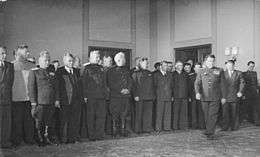People's Control Commission (East Germany)

The Soviet Control Commission (German: Sowjetische Kontrollkommission) was a Soviet monitoring and management committee overseeing the leadership of the German Democratic Republic and was active between 10 October 1949 to 28 May 1953. Their legitimacy was justified in agreements that had been made by the victorious powers at the Potsdam Conference (17 July to 2 August 1945). After that, the military government transferred its functions for a transitional period to formally fine German administrative organs. It replaced the Soviet Military Administration in Germany, which had previously exercised the sole administrative authority in the Soviet zone of occupation. With the founding of the German Democratic Republic on 7 October 1949, the Commission was given the requirements to replace the military government. This meant, however, that the East German government could operate independently of the West. The Soviet Control Commission could always overrule the decisions of the commission in East Germany if the decision of the East German commission were considered at odds with the official Soviet policies. Local officials had little power to make decisions or revise the decisions made. They controlled both the government of the GDR and the state governments. It was considered the ultimate power of authority both in the Soviet zone and in the former GDR.[1]
General Vasily I oversaw the Commission's creation, as head of the SKK Supreme Commander of the Group of Soviet occupation troops in Germany. Army . Chuikov became head of the Commission shortly thereafter. The SKK monitored the implementation of the "Potsdam Conference" agreements and the other Allied decisions in the GDR. They also had to represent the interests of the Soviet Union in the GDR. But they also supported the SED in their actions against internal and external political opponents. After the death of Josef Stalin, the Commission became known as the "High Commission of the USSR in Germany". The former political adviser to General Chuikov, Vladimir S. Semyonov, was appointed as the High Commissioner. The USSR ratified the Commission on 20 September 1955 by the signing the treaty with the East German government's "full sovereignty" of the GDR.[2]
The office of the Soviet High Commissioner was abolished. In fact, the USSR practiced though to a control function, which was after the dissolution of SKK and the High Commissioner particularly exercised by the Soviet Embassy in East Germany and backed by the continued presence of Soviet troops in East Germany.[3]
See also
- Merger of the KPD and SPD into the Socialist Unity Party of Germany
- German People's Congress
- German People's Council
- German Economic Commission
References
- ↑ Günther Heydemann: Die SBZ- und DDR-Forschung im Institut für Zeitgeschichte, in: Horst Möller, Udo Wengst (Hrsg.): 50 Jahre Institut für Zeitgeschichte. Eine Bilanz, Oldenbourg, München 1999, ISBN 3-486-56460-9, S. 469–486, hier S. 479.
- ↑ Hans-Ulrich Wehler: Deutsche Gesellschaftsgeschichte, Bd. 5: Bundesrepublik Deutschland und DDR 1949–1990, C.H. Beck, München 2008, S. 31.
- ↑ Klaus Schroeder: Der SED-Staat – Partei, Staat und Gesellschaft 1949–1990, 1998, S. 131 f.